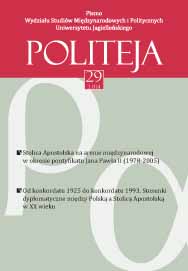‘Comunità internazionale’ e ‘famiglia umana’ nel pensiero e nell’azione di Giovanni Paolo II
The “international community and the “global affairs” in the teaching and activity of John Paul II
Author(s): Lorenzo OrnaghiSubject(s): Politics / Political Sciences
Published by: KSIĘGARNIA AKADEMICKA Sp. z o.o.
Keywords: papal teaching; international relations; globalisation; the Holy See; John Paul II; Catholic social teaching
Summary/Abstract: During the course of John Paul II’s pontificate the Holy See gained considerable significance in the international system. Its diplomatic function was also renovated. The states that played the most important role in world politics and the main international institutions realized the existence of this change soon after the archbishop of Kraków was chosen as the head of the Holy See. Such a change, initiated and continued within a system which assumed more and more clear outlines, consisted above all in the considerable strengthening of universalism in which the Church tried to interpret its original catholic vocation in the face of the rhythms, the extent and the unexpected consequences of the process of globalization. At first glance, two fundamental phenomena: the increased global role of the pontificate (associated also with media broadcasting) and the change of the international (or global) situation seem separate. However, they seem to be so only, if not exclusively, due to analytical reasons. For historiographic reasons, a holistic treatment of the increasing role and the activity of the Holy See in the world arena in a wide array of contemporary international events would satisfy the requirements of in‑depth and specialist research (e.g. the processes of changes and their transformations, the more or less stable balance of power and the lack of balance, efforts directed toward the rebuilding of the balance of power). And conversely – the following insights or research would prove partial and incomplete in the same way: research and insights which would consider the ever increasing “universalistic” presence of the Catholic Church, but which would perceive this phenomenon only through the perspective of the stages of the internal history of the church community, omitting and or dismissing as sideshows and remote phenomena certain forces of the global system, in which geopolitical and economic alliances started to appear with amazing rapidity in the last decades of the second millennium. Two phenomena, considering the order of events and the historical context, became indissolubly linked. As a result of this one cannot acquire in‑depth knowledge about the reality of any of these two phenomena individually if one fails to understand the nature of the second phenomenon. The mutual overlap of the strictly ecclesiastical and political dimensions forms the basis (also the methodological basis) of this analysis, in which three basic statements are essentially considered.
Journal: Politeja - Pismo Wydziału Studiów Międzynarodowych i Politycznych Uniwersytetu Jagiellońskiego
- Issue Year: 11/2014
- Issue No: 29
- Page Range: 37-53
- Page Count: 17
- Language: Italian

